Tuesday, September 27, 2005
I dropped by TechLearn in Las Vegas this week because I wanted to witness the end of an era. I’ve been to TechLearn every year since 1998. This was the first year with no presence from founder Elliott Masie. I don’t expect TechLearn to last long without him.
Things kicked off Sunday night with a delightful cocktail reception on the back porch of the Bellagio. It was chock-a-block with old friends. Once the crowd was light-headed, we filed into the ballroom for the opening session. “This conference is all about networking with one another,” we were told. “That’s why we chose this venue, the magnificent Bellagio hotel.” Huh? It’s hard to imagine a place with more distractions. You have to walk past fine restaurants, clanging slot machines, buxom cocktail waitresses, live lounge acts, and half a dozen bars just to get to the Bellagio Conference Center.
TechLearn this year was combined with the much larger ICCM show forcall contact centers because the two fields “have so much in common.” The two groups came together for keynotes but otherwise had no overlap (in spite of our commonality). Questex was the host of the event, not Advanstar, but no one mentioned the spinout which created Questex last April. Not a word was said about who these guys are and how they came to own TechLearn.
 Ann Rhoades, a former executive and now board member of JetBlue who bills herself as a Culture Transformation Guru, gave an opening presentation on creating a value-driven organization. She advised us to let peers hire future members of their teams and to hire for values, not for experience. JetBlue’s best flight attendant is a 63 year old retired fireman. The
Ann Rhoades, a former executive and now board member of JetBlue who bills herself as a Culture Transformation Guru, gave an opening presentation on creating a value-driven organization. She advised us to let peers hire future members of their teams and to hire for values, not for experience. JetBlue’s best flight attendant is a 63 year old retired fireman. The call contact center people perked up upon hearing that turnover among JetBlue’s 700 home-based reservation agents is less than 12%. After what seemed like too long, Ann sat down, Josh Bersin took the stage, and despite pleas from the conference organizers, the call center people walked out, leaving perhaps 150 people in the ballroom.
 Josh told us the “e” now stands for “enterprise,” and that industry revenue climbed 4.1% last year. He compared corporate universities to the old glass-house data processing departments that morphed into IT. The universities are becoming “learning services.”
Josh told us the “e” now stands for “enterprise,” and that industry revenue climbed 4.1% last year. He compared corporate universities to the old glass-house data processing departments that morphed into IT. The universities are becoming “learning services.”
Josh walked us through the results of a survey of two to three hundred companies. Their top priorities for learning are alignment with corporate strategy, improving program effectiveness, increasing usage, and cutting costs; these all strike me as fixing things that are broken more than building new capabilities. A third of the companies expect their eLearning to grow significantly; half expect slight growth.
eLearning is evolving to a higher level, “Learning on Demand.” My pal Eilif at SRI Consulting – Business Intelligence will be happy to learn he was six years ahead of his time in naming the latest trend. Learning on Demand includes performance support and RSS, which warms my heart; I don’t understand how this is positive for LMS vendors, since LMS do not track them.
With Peoplesoft, Docent, Thinq, Pathlore, and KnowledgeImpact losing their identities, more than half of all LMS customers own an LMS from a company that no longer exists. Only 56% of large enterprises have an LMS, 44% of medium enterprises and 12% of small to medium businesses. Josh and I must have a half empty/half full thing going on here. He says this shows there’s lots of LMS market left; it tells me lots of businesses have figured out they can live without an LMS. Almost half of LMS customers use them for tracking and reporting, twice as many as use them to manage enterprise initiatives or improve efficiency. I’ll take doing over reporting any day.
I like Josh’s taxonomy of learning governance: Soviet top-down, American federated, and anarchist. I turned in early so I’d have the energy to roll out of bed in the morning to hear John Cleese kick things off at 8:00 am. Unfortunately I had to hear a recap of the previous evening’s speeches before John came on stage. Wedged between two droll set-pieces, John recounted the message of Guy Claxton’s Hare Brain, Tortoise Mind about taking time for reflection. Business culture so stresses snap judgment that stopping to think about something is easily mistaken for laziness.
 TechLearn’s 51 exhibitors were squeezed into the back of the ballroom where the keynotes were delivered. Unlike Training or ASTD, the regulation 10x10 booths crammed together at TechLearn felt very small townish.
TechLearn’s 51 exhibitors were squeezed into the back of the ballroom where the keynotes were delivered. Unlike Training or ASTD, the regulation 10x10 booths crammed together at TechLearn felt very small townish.
I took off for lunch at the bistro at Paris and then back to my room at the Monte Carlo to write. Monday's evening reception, this one on GeoLearn's tab, was another great chance to schmooze.
Tuesday I decided to take John Cleese's advice and stayed in my room to write and reflect. I got an automatic late checkout (the hotel's computers were down and they had no idea who was in what rooms). Around 2:00 pm I left for McClaren. I had set myself a new record: I did not attend a single breakout session. That hardly qualifies me to assess the event, but of course, I will do so anyway.
I think people will flock to Learning 2005 for networking and experimentation. Shoppers will crawl the aisles at ASTD. Shoppers who dislike immense crowds will go to Training instead. Online Educa in Berlin will continue to prosper. And within a couple of years, TechLearn will be no more. That's just my opinion. I might be wrong.
P.S.
More and more, I believe that speaking person to person, in an honest voice, with sincerity and feeling, trumps advertising bombast and doublespeak. How can you trust someone who comes up with double helpings of BS like this?
Things kicked off Sunday night with a delightful cocktail reception on the back porch of the Bellagio. It was chock-a-block with old friends. Once the crowd was light-headed, we filed into the ballroom for the opening session. “This conference is all about networking with one another,” we were told. “That’s why we chose this venue, the magnificent Bellagio hotel.” Huh? It’s hard to imagine a place with more distractions. You have to walk past fine restaurants, clanging slot machines, buxom cocktail waitresses, live lounge acts, and half a dozen bars just to get to the Bellagio Conference Center.
TechLearn this year was combined with the much larger ICCM show for
 Ann Rhoades, a former executive and now board member of JetBlue who bills herself as a Culture Transformation Guru, gave an opening presentation on creating a value-driven organization. She advised us to let peers hire future members of their teams and to hire for values, not for experience. JetBlue’s best flight attendant is a 63 year old retired fireman. The
Ann Rhoades, a former executive and now board member of JetBlue who bills herself as a Culture Transformation Guru, gave an opening presentation on creating a value-driven organization. She advised us to let peers hire future members of their teams and to hire for values, not for experience. JetBlue’s best flight attendant is a 63 year old retired fireman. The  Josh told us the “e” now stands for “enterprise,” and that industry revenue climbed 4.1% last year. He compared corporate universities to the old glass-house data processing departments that morphed into IT. The universities are becoming “learning services.”
Josh told us the “e” now stands for “enterprise,” and that industry revenue climbed 4.1% last year. He compared corporate universities to the old glass-house data processing departments that morphed into IT. The universities are becoming “learning services.”Josh walked us through the results of a survey of two to three hundred companies. Their top priorities for learning are alignment with corporate strategy, improving program effectiveness, increasing usage, and cutting costs; these all strike me as fixing things that are broken more than building new capabilities. A third of the companies expect their eLearning to grow significantly; half expect slight growth.
eLearning is evolving to a higher level, “Learning on Demand.” My pal Eilif at SRI Consulting – Business Intelligence will be happy to learn he was six years ahead of his time in naming the latest trend. Learning on Demand includes performance support and RSS, which warms my heart; I don’t understand how this is positive for LMS vendors, since LMS do not track them.
With Peoplesoft, Docent, Thinq, Pathlore, and KnowledgeImpact losing their identities, more than half of all LMS customers own an LMS from a company that no longer exists. Only 56% of large enterprises have an LMS, 44% of medium enterprises and 12% of small to medium businesses. Josh and I must have a half empty/half full thing going on here. He says this shows there’s lots of LMS market left; it tells me lots of businesses have figured out they can live without an LMS. Almost half of LMS customers use them for tracking and reporting, twice as many as use them to manage enterprise initiatives or improve efficiency. I’ll take doing over reporting any day.
I like Josh’s taxonomy of learning governance: Soviet top-down, American federated, and anarchist. I turned in early so I’d have the energy to roll out of bed in the morning to hear John Cleese kick things off at 8:00 am. Unfortunately I had to hear a recap of the previous evening’s speeches before John came on stage. Wedged between two droll set-pieces, John recounted the message of Guy Claxton’s Hare Brain, Tortoise Mind about taking time for reflection. Business culture so stresses snap judgment that stopping to think about something is easily mistaken for laziness.
 TechLearn’s 51 exhibitors were squeezed into the back of the ballroom where the keynotes were delivered. Unlike Training or ASTD, the regulation 10x10 booths crammed together at TechLearn felt very small townish.
TechLearn’s 51 exhibitors were squeezed into the back of the ballroom where the keynotes were delivered. Unlike Training or ASTD, the regulation 10x10 booths crammed together at TechLearn felt very small townish.I took off for lunch at the bistro at Paris and then back to my room at the Monte Carlo to write. Monday's evening reception, this one on GeoLearn's tab, was another great chance to schmooze.
Tuesday I decided to take John Cleese's advice and stayed in my room to write and reflect. I got an automatic late checkout (the hotel's computers were down and they had no idea who was in what rooms). Around 2:00 pm I left for McClaren. I had set myself a new record: I did not attend a single breakout session. That hardly qualifies me to assess the event, but of course, I will do so anyway.
I think people will flock to Learning 2005 for networking and experimentation. Shoppers will crawl the aisles at ASTD. Shoppers who dislike immense crowds will go to Training instead. Online Educa in Berlin will continue to prosper. And within a couple of years, TechLearn will be no more. That's just my opinion. I might be wrong.
P.S.
More and more, I believe that speaking person to person, in an honest voice, with sincerity and feeling, trumps advertising bombast and doublespeak. How can you trust someone who comes up with double helpings of BS like this?
Bigger and better than ever, the year’s most important and anticipated gathering of learning and training professionals is back, with the most actionable, practitioner-led program in its ten-year history.What a turn-off.
TechLearn 2005 focuses with laser-like precision on your most pressing technology, process, and people-related issues. The insights and advice you’ll gain during the conference sessions – combined with the products and services you’ll find in the Learning Showcase – offer a cohesive and compelling set of solutions to your most mission-critical challenges.
Your performance -- and your ability to positively and measurably improve organizational performance through learning -- is TechLearn’s single most critical goal. We hope you’ll join us!







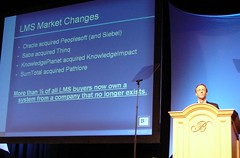
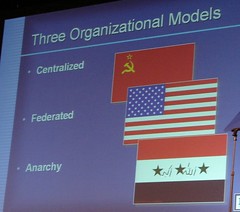


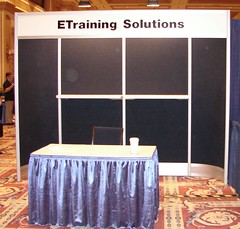
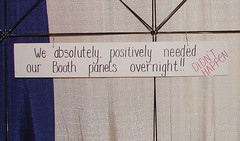
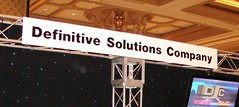
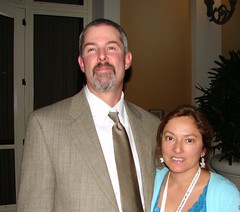




2 Comments:
Jay,
Thanks for the review of TechLearn. At Elliot's final TechLearn last year, the writing was on the wall (especially after seeing the advanstar guys on stage) and I did not think it was even worth a curiosity trip out to Vegas this year. I am glad you confirmed my suspicions (without me having to pay the conference fees or travel)!
I look forward to Learning 2005. Who knows what will happen there because it will not be a regular conference. But that is why I look forward to it...
Regards,
Rovy
Spot-on comments about distracting venues and droning keynoters. I have vivid memories of exactly one keynote address - James Burke ("Connections," "The Day the Universe Changed") taking us on a wild ride through his amazing brain.
Next year, try the Open Content conference at Utah State (happeing right now, conference wiki here: http://opencontent.org/wiki/index.php?title=OpenEducation2005). Very high signal-to-noise ratio, corporate presence almost nil. (FWIW, John Seeley Brown was the opening keynoter.)
My experience with breakouts is that 50% of the I could have given myself and done at least as good a job if not better. 25% are a total waste of time. 25% have at least one take-away, if only that no-one else is doing things any better, smarter or faster, and yes, it really IS this hard to turn out quality work.
And invariably there is one session that you skipped, but should not have, because it's all the buzz that evening. :-)
Post a Comment
<< Home